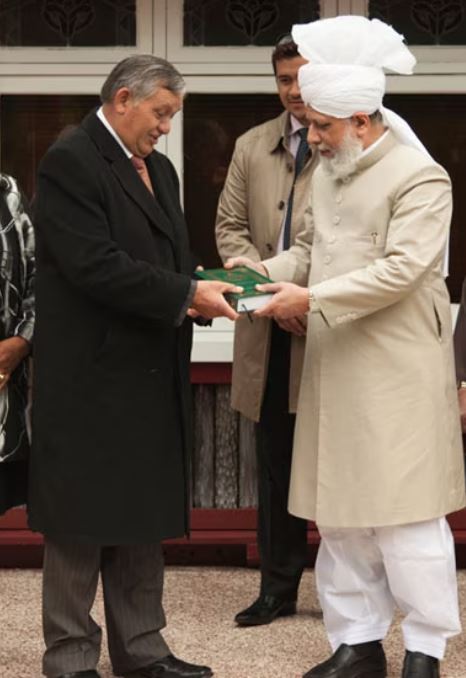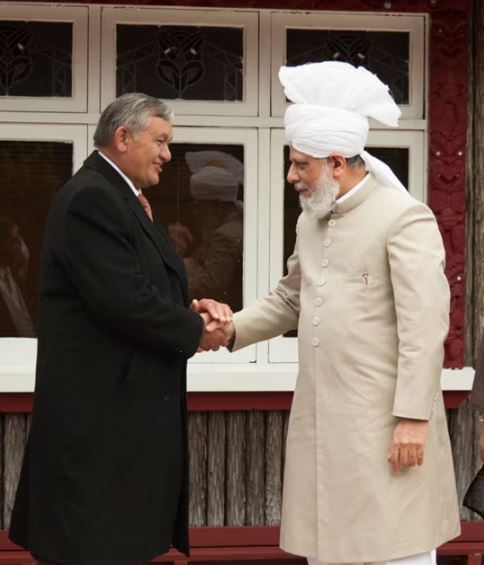Asif Munir, Missionary, New Zealand

On 30 August, New Zealand and the Māori community experienced a profound loss with the passing of their Māori King, Tuheitia Paki, at the age of 69. His death led many to gather at Turangawaewae Marae (pronounced too-rahng-ah-why-why), a site of immense cultural and historical significance. A Marae is a communal or sacred place that serves both religious and social purposes. This site has welcomed world leaders such as Queen Elizabeth II and Nelson Mandela with warmth and respect.
I had the privilege of visiting Turangawaewae Marae to offer my condolences. As I sat among the Māori community, listening to speeches in Māori, I felt a profound sense of connection despite not understanding the language. For us Ahmadi Muslims, this place holds special significance. It was here in 2013 that our beloved Huzooraa was invited by King Tuheitia and his people. During this visit, Huzooraa presented King Tuheitia with a historic gift: the first-ever Māori translation of the Holy Quran, known as ‘Kurānu Tapu’. This translation was a milestone achieved through the dedicated efforts of the late Shakeel Ahmad Munir Sahib, who spent over 20 years learning the Māori language.
The impact of this meeting was so profound that King Tuheitia also attended the opening of our first mosque in New Zealand, Baitul Muqeet, which was inaugurated by Huzooraa himself. This unprecedented visit was a powerful display of the mutual respect between the Māori King and Huzooraa.
Māori culture has been preserved remarkably well. The role of the Māori King, while not politically authoritative, symbolises unity among the Māori people. Although not all Māori tribes recognise the King as their ruler, he remains a respected leader and a prominent figure. His interest in meeting with Huzooraa was a significant gesture, reflecting a shared commitment to understanding and peace.
Many Ahmadis around the world vividly remember the profound moment in 2013 when the iconic Māori Haka was performed in the presence of Huzooraa at this very Marae. The Haka is often performed to welcome important visitors or dignitaries. It is a powerful and energetic expression of respect and hospitality. Reflecting on this moment, I felt deeply humbled, knowing that a Khalifa had once stood on the same ground where I was now present.
Huzooraa has often spoken about the importance of sharing the Holy Quran’s message of peace and unity. In 2013 at Turangawaewae Marae, he emphasised that ‘‘the Quran teaches people how to live together in peace, and certainly today we need love, peace, and reconciliation to spread far and wide—that is the message of the Quran.”
(“Muslim Leader Presents Quran to Maori King” www.pressahmadiyya.com)
In line with the Hadith of Prophet Muhammadsa, who said:
إِذَا أَتَاكُمْ كَرِيمُ قَوْمٍ فَأَكْرِمُوهُ
‘‘When a respected person from a nation comes to you, show him respect.’’ (Sunan Ibn Majah, Kitab al-adab, Bab idha ataakum karimu qaumin fa akrimuhu, Hadith 3712)
Huzooraa demonstrated profound respect for Māori traditions during his visit, when he and the Māori King performed the hongi, a traditional Māori greeting which involves the pressing of noses and foreheads together. Although this gesture was unfamiliar to our tradition, Huzooraa embraced it as a sign of respect and unity. This act of honouring Māori customs was rooted deeply within Islamic teachings on mutual respect.

Unfortunately, I was not present during Huzoor’saa visit to New Zealand, but I continually reflect on how Huzoor’saa message in the Marae remains incredibly relevant today. Sitting among the crowd at Turangawaewae Marae, I initially felt that I might be the only Muslim present. However, I was soon greeted by a Māori gentleman with a “Salam”—a Māori Muslim who also spoke Arabic. We spoke at length about Māori culture, Islam, and Huzoor’saa memorable visit to the Marae. He was particularly impressed by the Jamaat’s remarkable achievement in translating the Holy Quran into Māori. When I asked if there were other Muslims, he replied ‘no’. This may have been why many Māori appreciated my presence. I also spoke with one of the Marae caretakers who fondly recalled Huzoor’saa visit in 2013.
This experience made me grateful to be an Ahmadi Muslim, as we are blessed with a Khalifa who is a global figure in promoting peace, not merely through speeches, but by embodying these values in daily life. Under his leadership, Ahmadi Muslims worldwide strive to live peacefully with others and build bridges wherever possible.
It is deeply disheartening that some Muslims have tarnished Islam’s image by portraying it as intolerant. In stark contrast, the life of the Prophet Muhammadsa is filled with profound examples of respect and compassion towards non-Muslims. A notable instance is when the Christians of Najran visited him in Medina, and he graciously allowed them to pray in the mosque, declaring it open to their worship. (Ibn Hisham, Al-Sirah al-Nabawiyyah, 1955, Vol. I, ed. Mustafa as-Saqqa, Cairo: Mustafa al-Babi al-Halabi, pp. 575-577)
By the grace of God Almighty, we are blessed with a Khalifa who reminds the world of Islam’s true message, by displaying such sentiments towards non-Muslims. No other Muslim leader illustrates this level of compassion and understanding towards non-Muslims. During his meeting with the Māori King, Huzooraa expressed his hope that the mutual friendship between the Ahmadiyya Muslim Community and the Māori community would endure forever. (“Muslim Leader Presents Quran to Maori King” www.pressahmadiyya.com)
This heartfelt sentiment resonates deeply with us, as members of the Ahmadiyya Muslim Community around the world carry Huzoor’saa message in our hearts, even in the most distant corners of the globe. The guidance provided by Khilafat serves as our beacon in today’s complex society. Through the teachings of Islam, we are continually inspired to embody the values of respect, unity, and compassion.
May the legacy of King Tuheitia inspire future generations to uphold these principles of compassion, and may the bond between Ahmadis and the Māori flourish forever. Amin.

